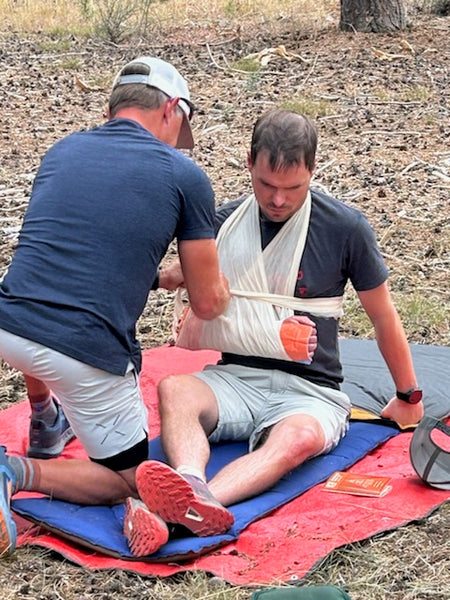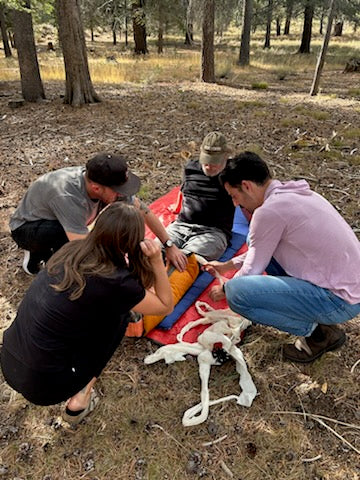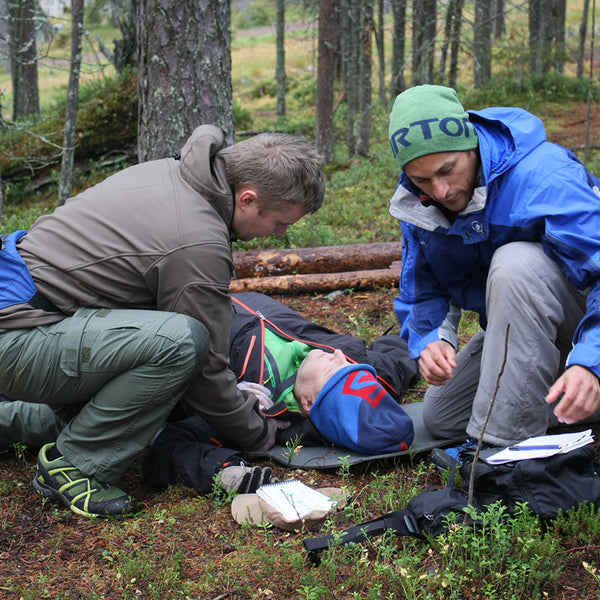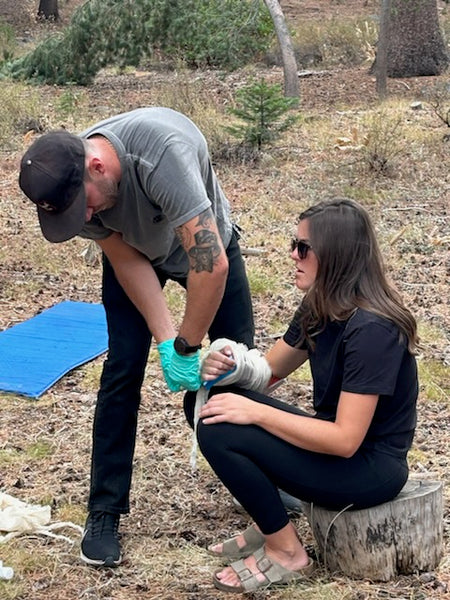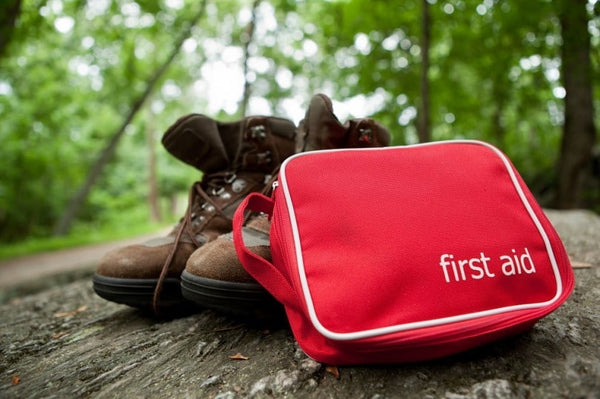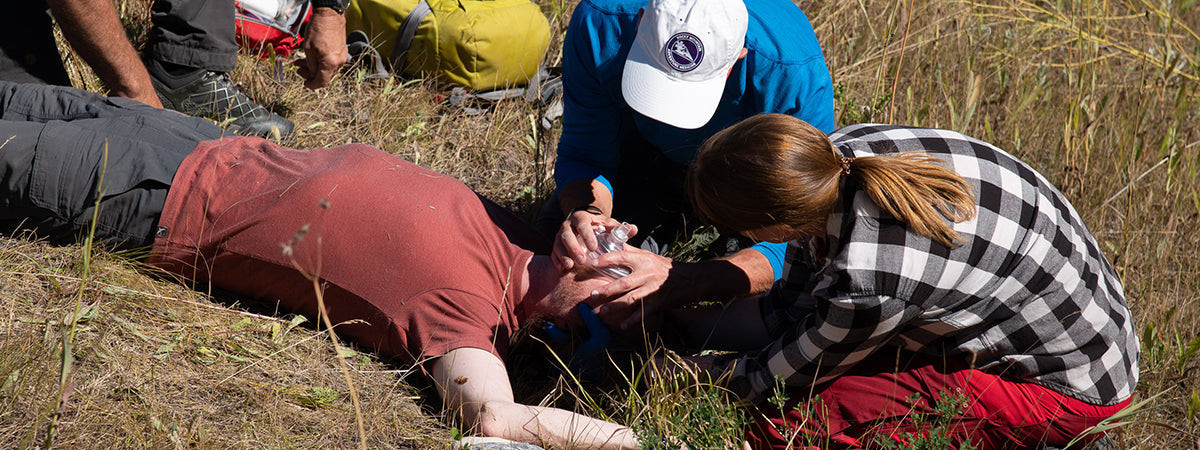
Wilderness First Aid (WFA) in Tahoe
Includes ASHI (American Safety & Health Institute) WFA & CPR certifications.
We'll cover the following topics and skills:
- The Patient Assessment System
- How to provide effective first aid treatment for injuries and illnesses common in the outdoors
- Techniques to improvise first aid solutions in the backcountry
- How to make appropriate evacuation decisions
Upon completion of the course, you'll receive:
- 16-hour Wilderness First Aid Certification from ASHI (American Safety & Health Institute)
- AED and Adult/Child Cardiopulmonary Resuscitation (CPR) Certificate from ASHI
This program requires at least 4 participants to run.
Here's the schedule for your course:
Field Day 1
- 8:00 am - Meet your instructor and review the plan for the day.
- 9:30 am - We'll spend the day demonstrating and coaching while you practice wilderness first aid skills
- 12:00pm - Lunch on the go
- 3:30pm - We will close the program at the trailhead with a quick review of the skills that we learned and an overview of what to expect the following day in the field.
Field Day 2
- 8:00 am Meet your instructor and review the plan for the day.
- 9:30 am - We'll spend the day demonstrating and coaching while you practice wilderness first aid skills
- 12:00pm - Lunch on the go
- 3:30pm - We will close the program at the trailhead with a quick review of the skills that we learned and next steps you can take to apply these skills and further your wilderness first aid education.
- Minimal Fitness - This program involves minimal physical fitness and is appropriate for anyone who is able to travel a couple miles over the course of the day.
Here's what's included with your course:
- Expert WFA Instructor
- Innovative Curriculum
- 16hr ASHI (American Safety and Health Institute) Wilderness First Aid Certification (Valid for two years)
- ASHI Adult/Child CPR and AED Certification (Valid for two years)
Clothing & Accessories
- Light Outerwear (check the weather)
- Multiple Midlayer Options
- Gloves
- Beanie
- Baseball Cap
- Sunglasses
- Sunscreen
- Water Bottle / Hydration Pack (2L)
- Lunch and Snacks
Know Before you go

PRIVATE PROGRAMS
- Custom Scheduling: Choose your dates and plan around your availability.
- Tailored Experiences: Itineraries and objectives are adjusted to suit your goals, experience, and fitness.
- Cost-Effective for Most Large Groups: Private programs are typically more cost-effective for groups of 3 or more.
- Flexibility Comes at a Price: For groups of 1-2, private programs are generally more expensive.
- AIARE Courses: AIARE course pricing is based on a group of 6. Running these as a private program with fewer than 6 participants will increase the per-person cost.
SCHEDULED PROGRAMS
- Fixed Dates & Costs: Scheduled programs have set dates, itineraries, objectives, and pricing.
- Great for Solo or Small Groups: Ideal for individuals or small groups looking to share costs with others.
- Affordable for 1-2 People: Scheduled programs are typically less expensive for groups of 1-2.
- Less Flexibility: Dates fill quickly, and group programs require adapting to the skill level and pace of all participants
- Group Atmosphere: Meet others with similar interests and make some new backcountry buddies!
Note: Any scheduled program can also be run as a private program with customized dates and rates.
Both options offer exceptional guiding and experiences. Choose what works best for you!
This course begins with email correspondence between you and your instructor. Your Instructor will begin by assigning you any pre-course reading. They will also include where and when to meet, weather concerns, and the ideal time to be back at the cars.
Course Outline
Basic Life Support/CPR/Intro to Trauma
• Introductions and Paperwork
• How to keep situations from getting worse
• Scene Survey: What to think about first: scene safety, personal safety, method
of injury and resources
• Blood Borne pathogens: safety, prevention and body substance isolation, Hep B, AIDS, etc.
• Primary Survey: BLS: Nervous system: brain and spinal cord; Circulatory
System, and Respiratory System
• AED Training
• Hands on practice w/scenarios
• CPR testing
Trauma and Scenarios
• Trauma: Head Injuries, Internal Bleeding/Volume Shock, Respiratory Distress
• Lots of Hand on Scenarios
• Stable vs. Unstable Musculoskeletal Injuries
• Dislocations
• Improvised Splinting Lab
• Spine Management
• Documentation and Soap Notes
• Wounds and Environmental Problems
• Wounds and Wounds Lab
• High risk vs low risk wounds and treatment
• Burns and blisters
• Infection
Environmental Problems
• Cold injuries and Hypothermia
• Heat Injuries
• Heat stroke vs. heat exhaustion
• Electrolyte sickness
• Altitude Sickness
• Lightning
• Toxins
• Allergic Reactions; Anaphylaxis and local
• Environmental Scenarios
Medical Problems
Short medical scenarios involving:
• Heart attacks: Signs and symptoms/treatment
• Asthma
• Stoke/Seizure
• Diabetes
• Big Scenarios-Incorporating all the medical and environmental problems
• Course Wrap
Field Day 1
8:00 am Meet your instructor and review the plan for the day.
3:30 pm We will close the program at the trailhead with a quick review of the skills that we learned and an overview of what to expect the following day in the field.
Field Day 2
8:00 am Meet your instructor and review the plan for the day.
3:30 pm We will close the program at the trailhead with a quick review of the skills that we learned and next steps you can take to apply these skills and further your wilderness first aid education.
We'll cover the following topics and skills:
- The Patient Assessment System
- How to provide effective first aid treatment for injuries and illnesses common in the outdoors
- Techniques to improvise first aid solutions in the backcountry
- How to make appropriate evacuation decisions
Upon completion of the course, you'll receive:
- 16-hour Wilderness First Aid Certification from ASHI (American Safety & Health Institute)
- AED and Adult/Child Cardiopulmonary Resuscitation (CPR) Certificate from ASHI
This program requires at least 4 participants to run.
Here's the schedule for your course:
Field Day 1
- 8:00 am - Meet your instructor and review the plan for the day.
- 9:30 am - We'll spend the day demonstrating and coaching while you practice wilderness first aid skills
- 12:00pm - Lunch on the go
- 3:30pm - We will close the program at the trailhead with a quick review of the skills that we learned and an overview of what to expect the following day in the field.
Field Day 2
- 8:00 am Meet your instructor and review the plan for the day.
- 9:30 am - We'll spend the day demonstrating and coaching while you practice wilderness first aid skills
- 12:00pm - Lunch on the go
- 3:30pm - We will close the program at the trailhead with a quick review of the skills that we learned and next steps you can take to apply these skills and further your wilderness first aid education.
- Minimal Fitness - This program involves minimal physical fitness and is appropriate for anyone who is able to travel a couple miles over the course of the day.
Here's what's included with your course:
- Expert WFA Instructor
- Innovative Curriculum
- 16hr ASHI (American Safety and Health Institute) Wilderness First Aid Certification (Valid for two years)
- ASHI Adult/Child CPR and AED Certification (Valid for two years)
Clothing & Accessories
- Light Outerwear (check the weather)
- Multiple Midlayer Options
- Gloves
- Beanie
- Baseball Cap
- Sunglasses
- Sunscreen
- Water Bottle / Hydration Pack (2L)
- Lunch and Snacks
Epic Reviews From Adventurers
the blackbird difference
We’re here to help. Our FAQs or Gear Lists might have the information you’re seeking. But If you’re not finding the information you need, we’d be happy to help!
